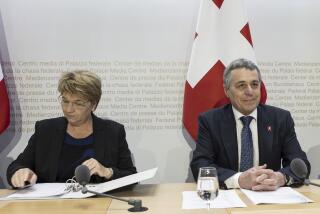Platitudes, Pledges Likely at Bonn Talks
- Share via
BONN — Because of differing views between the United States and its major trading partners, little more than platitudes and generalized pledges are likely to come out of the annual seven-nation economic summit that opens here Thursday, planners for the meeting indicate.
The sources said that the other industrial nations will reject U.S. urgings to stimulate their own economic growth to take up the slack as the American economy slows down.
At the same time, France appears to be determined to block any commitment on another Reagan Administration objective--setting a date in 1986 for the start of a new round of trade liberalization negotiations.
President Francois Mitterrand believes that such a date cannot be fixed by the seven-nation summit and can only be agreed upon by all the members of the General Agreement on Trade and Tariffs, the U.N.-related international trade organization, after preparatory work has been concluded later this summer.
Mitterrand, according to briefings in Paris, will also insist that the United States make a parallel commitment to reform of the international monetary system.
Meager Results Expected
The outlook for substantive agreements at the three-day meeting is therefore meager. That, however, tends to be the normal outcome of the economic summits.
In the decade since the first economic summit was convened by French President Valery Giscard d’Estaing, at the Rambouillet Chateau outside of Paris in 1975, the meetings always have been long on exchange of views and short on results.
The difficulty of seven heads of government coming to decisions will be well illustrated this year by the question of what to do about the pending slowdown in U.S.--and possibly world--economic growth.
Treasury Secretary James A. Baker III has been pressing the West Germans and the Japanese in particular to “go for growth,” and he reiterated in Washington in a pre-summit briefing that “it is very important for other industrial nations that are in a position to do so to pick up the slack.”
However, the recent drop in the U.S. growth rate--estimated to be down to 1.3% in the first quarter of this year--and new up and down volatility in the strength of the dollar have generally convinced European governments that they should hold fast to a steady and conservative course.
Fear of Budget Deficits
“The last thing other industrial countries want to do right now is to increase their budget deficits just when the U.S. is getting to grips with reducing its own,” British Chancellor of the Exchequer Nigel Lawson said in London.
In West Germany, the president of the Bundesbank, the country’s equivalent of the Federal Reserve, Karl Otto Poehl, said that growth fed by increased deficits loses what temporary benefits it might bring.
He recalled that at the 1978 economic summit in Bonn, then-Chancellor Helmut Schmidt agreed to boost growth by around 1%. The result, Poehl said, was to raise the country’s deficit from 3% of gross national product to almost 6%.
The West German, British and French governments have all either promised or are considering tax cuts, which usually stimulate an economy. These will not come very soon, though, and they will be marginal and cautious.
Bonn is talking about cutting taxes by 20 billion deutsche marks in two stages in 1986 and 1987. Treasury Secretary Baker, reflecting the U.S. view, thinks that is too little, too late to take up the slack in the falling American growth rate.
Nobody in Europe disagrees with assessments of the problem. The U.S. growth rate in 1984 was more than 6%, but in 1985 it is now unlikely to exceed 3.5%. The overall European growth rate is also running at around 3.5%--but a large part of that growth is due to exports to the United States. As U.S. demand slows down, Europe will be hard-pressed to sustain even that modest growth.
However, the Europeans seem to prefer slower growth to the American problem of high budget deficits, and they will want to sit tight.
On the eve of the summit they got a boost for this view from the International Monetary Fund in Washington, which said in its semiannual report on the world economic outlook:
“In general, recent trends give no grounds for change in the basic course of fiscal and monetary policy in the European countries and Japan.”
More to Read
Sign up for Essential California
The most important California stories and recommendations in your inbox every morning.
You may occasionally receive promotional content from the Los Angeles Times.













